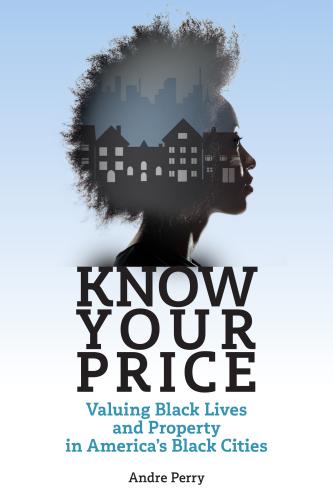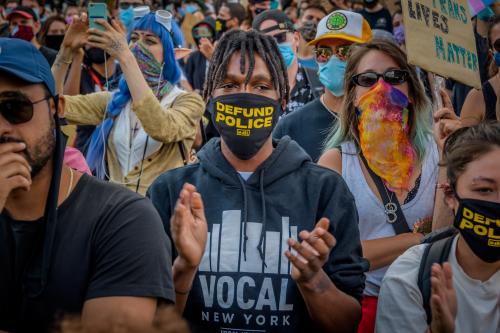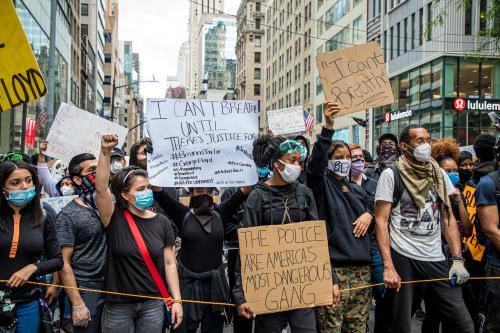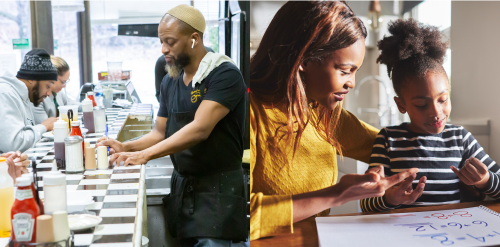As Black Americans have progressed from being owned to becoming owners, the state of Black businesses can offer insights into the advancement of race relations and democracy in America. And while the nation commemorates the end of slavery this Juneteenth, Black-owned businesses are still being systematically denied financial investments in ways that throttle wealth creation for Black entrepreneurs and national productivity as a whole. Amid a national reckoning around race and racism brought on by the murder of George Floyd, we have an opportunity to achieve racial parity in loans, investments, employment, and ownership.
In May, the U.S. Census Bureau updated its Annual Business Survey (ABS), detailing the characteristics of the country’s firms and their owners. The update—covering 2012 to 2017—is still outdated considering the impact of COVID-19 on these businesses and the massive federal relief packages Congress has recently passed. Nevertheless, the findings offer a glimpse of the long-standing business epidemic that has been disproportionately impacting Black business owners even before COVID-19, underscoring the need for relief and stimulus spending to address structural racism in the business world.
As of 2017, there were 5.7 million U.S. firms with paid employees, of which only 124,004 (2.2%) were Black-owned. During the same period, Black Americans made up 12.7% of the country’s population. From 2012 to 2017, the country added roughly 320,000 new employer businesses, but only 4.6% (or 14,866) were Black-owned.
Women—and specifically, Black women—were also underrepresented as business owners in the survey. Women represent more than half of the U.S. population, but they owned only one in five businesses (just over 1.1 million) in 2017. This was about the same proportion as it was in 2012. Black women owned less than 1% (one in 130) of the nation’s businesses in 2017, even though Black women made up 6.6% of the country’s population.
The underrepresentation of Black-owned and Black-woman-owned businesses throttles economic growth. Black-owned firms employed 1.2 million workers in 2017, while white-owned firms employed 56.8 million workers. About 44% of employees of classifiable firms worked for white-owned firms, compared to 1% for Black-owned firms. These figures do not include sole proprietors or firms with no paid employees.
The ongoing COVID-19 pandemic is compounding this harm, with evidence suggesting that Black business owners are bearing the brunt of the hardship among entrepreneurs. According to the Stanford Institute for Economic Policy Research, 40% of Black business owners were not working in April, compared to 17% of white business owners.
Furthermore, Black-owned businesses earn much of their revenue in sectors that are particularly affected by the recession. Black-owned firms with paid employees generated nearly $128 billion in receipts in 2017, with the largest share ($24.5 billion, or 19%) in the health care and social services sector. Health care is the most common industry for Black-owned businesses and the largest employer of their workers, accounting for 39,714 (32%) of Black-owned businesses with paid employees and 446,594 (37%) of their workers. And while COVID-19 places high demand on the certain aspects of the nation’s health care system, overall spending on health care has seen a precipitous decline due to lockdown measures. The second-largest sector for Black-owned firms by total receipts is retail ($16.9 billion), which is also among those hit hardest by the pandemic.
Given the vulnerability and lack of investment for Black- and Black-woman-led businesses, we must create national investment goals that include government and private investors. These goals would bring attention to this shared priority, guiding business owners, private investors, and government agencies on removing structural barriers while building capacity for Black-owned firms across the country. Doing so would increase Black income and wealth, boost local hiring, and anchor neighborhood revitalization.
With seed funding provided by the W.K. Kellogg Foundation and the Surdna Foundation, the Black-led impact investing and advisory firm CapEQ asked Brookings Metro to be the research partner for a national collaboration to advance Black businesses. Started two years ago, Path to 15|55 focuses on growing Black-led employer firms, harnessing assets in the Black community to drive scale and growth, and investing in interconnected systems that endorse polices that remove barriers and unleash catalytic capital.
The name “Path to 15|55” is based on research recognizing that if we can get 15% of Black-led businesses to hire at least one additional employee, the result would be 600,000 more jobs and approximately $55 billion for the economy. But creating that path will demand significant changes to the overall business climate.
Who gets to own property is unquestionably tied to our past and our future as a country. Juneteenth reminds us that the quest for freedom is central to Black people’s legacy—but it should also be a cue to the business community that we must continuously invest in that freedom by advancing Black-owned businesses.









Commentary
This Juneteenth, we should uplift America’s Black businesses
June 18, 2020